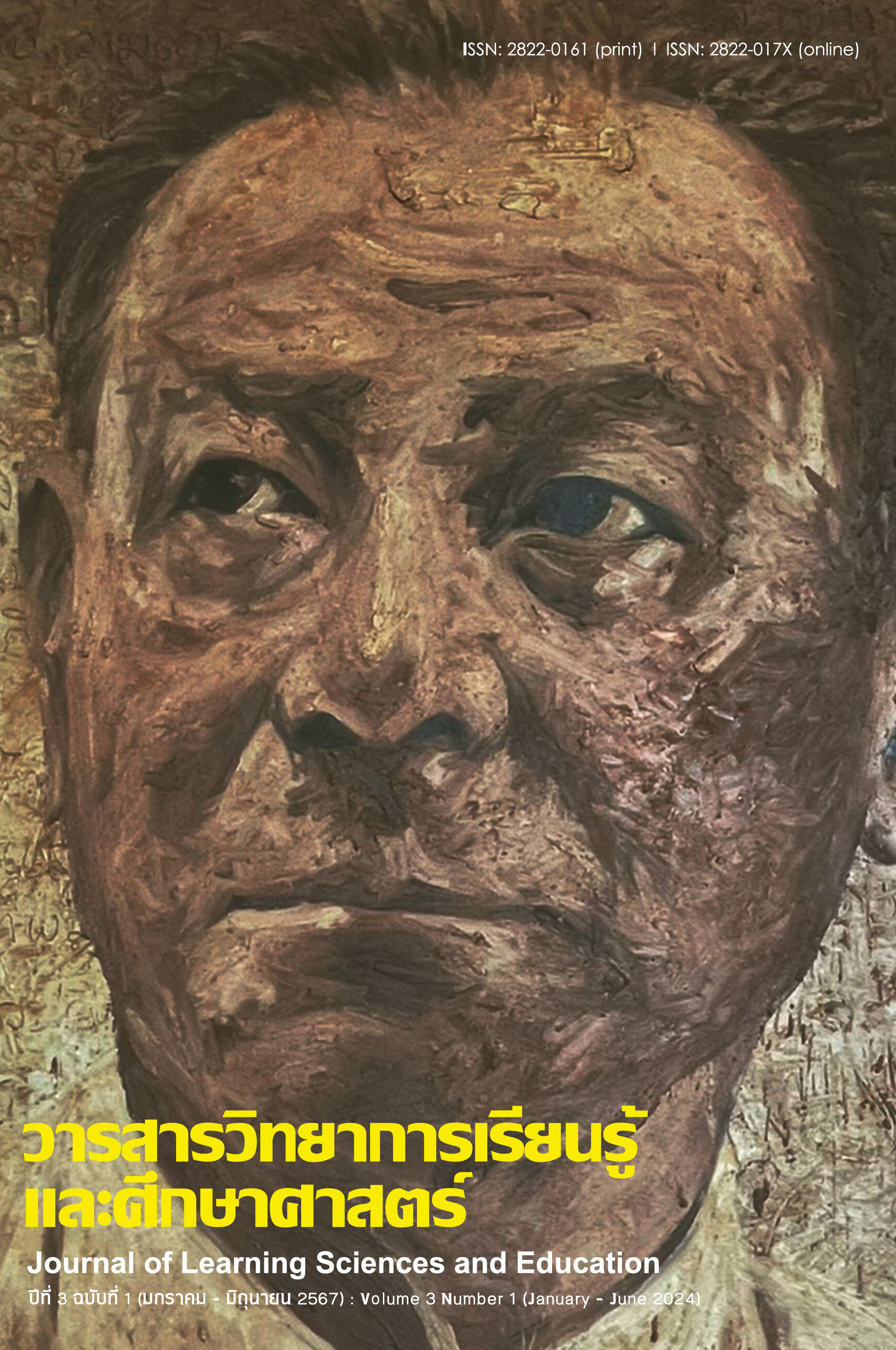การศึกษาปฏิสัมพันธ์ระหว่างปัจจัยส่วนบุคคลกับการรับรู้ความสามารถของตนเองในการตัดสินใจเลือกอาชีพของนักเรียนชั้นมัธยมศึกษาตอนต้น
Main Article Content
บทคัดย่อ
การประกอบอาชีพมีความสำคัญเป็นอย่างมากต่อมนุษย์และเศรษฐกิจ และการเลือกอาชีพที่เหมาะสมกับตนเองจะก่อให้เกิดความสุขและโอกาสที่จะประสบความสำเร็จในการทำงาน โดยเริ่มจากพิจารณาการรับรู้ความสามารถของตนเองด้านอาชีพ เพื่อประกอบการตัดสินใจในการเลือกอาชีพของตนเอง ซึ่งจะมีความแตกต่างกันตามช่วงวัยของบุคคล เนื่องจากในแต่ละช่วงวัยจะมีกระบวนการตัดสินใจเลือกอาชีพตามพัฒนาการ (Bandura, 1977; Howell, 1977) การศึกษาในครั้งนี้จึงมีวัตถุประสงค์ เพื่อ 1) ศึกษาระดับการรับรู้ความสามารถของตนเองในการตัดสินใจเลือกอาชีพของนักเรียนชั้นมัธยมศึกษาตอนต้น โรงเรียนแห่งหนึ่งในสังกัดกรุงเทพมหานคร และ 2) ศึกษาปฏิสัมพันธ์ระหว่างเพศและระดับชั้นที่ส่งผลต่อการรับรู้ความสามารถของตนเองในการตัดสินใจเลือกอาชีพ ของนักเรียนชั้นมัธยมศึกษาตอนต้น โรงเรียนแห่งหนึ่งในสังกัดกรุงเทพมหานคร กลุ่มตัวอย่าง คือ นักเรียนชั้นมัธยมศึกษาตอนต้น โรงเรียนแห่งหนึ่งในสังกัดกรุงเทพมหานคร ในภาคเรียนที่ 2 ปีการศึกษา 2565 จำนวน 316 คน โดยการสุ่มตัวอย่างแบบแบ่งชั้นภูมิ เครื่องมือที่ใช้ในการวิจัย คือ แบบวัดการรับรู้ความสามารถของตนเองในการตัดสินใจเลือกอาชีพ สถิติที่ใช้ในการวิเคราะห์ข้อมูล คือ ความถี่ ร้อยละ ค่าเฉลี่ย ส่วนเบี่ยงเบนมาตรฐาน และการวิเคราะห์ความแปรปรวนแบบสองทาง (Two-way ANOVA) ผลการวิจัยพบว่า 1) นักเรียนชั้นมัธยมศึกษาตอนต้น โรงเรียนแห่งหนึ่งในสังกัดกรุงเทพมหานครมีการรับรู้ความสามารถของตนเองในการตัดสินใจเลือกอาชีพ ในภาพรวมอยู่ในระดับปานกลาง (M = 2.79) โดยด้านการประเมินตนเองได้อย่างถูกต้อง อยู่ในระดับปานกลาง ซึ่งมีค่าเฉลี่ยน้อยที่สุด (M = 2.67) 2) ไม่มีปฏิสัมพันธ์ระหว่างเพศและระดับชั้นที่ส่งผลต่อการรับรู้ความสามารถของตนเองในการตัดสินใจเลือกอาชีพ แต่นักเรียนเพศชาย (M = 2.73) และเพศหญิง (M = 2.85) มีการรับรู้ความสามารถของตนเองในการตัดสินใจเลือกอาชีพ แตกต่างกันอย่างมีนัยสำคัญทางสถิติที่ระดับ .05
Article Details

อนุญาตภายใต้เงื่อนไข Creative Commons Attribution-NonCommercial-NoDerivatives 4.0 International License.
เอกสารอ้างอิง
Akhsania, K. N., Basuki, T., Sugiharto, D. Y. P., & Japar, M. (2020). Students’ career understanding and career decision making self-efficacy in junior high school. Islamic Guidance and Counseling Journal, 4(1), 12-20. DOI: https://doi.org/10.25217/igcj.v4i1.950
Aungyot, T., Khanthanatee, S., & Kampitak, N. (2021). ปัจจัยที่มีอิทธิพลต่อความปรารถนาในการเลือกอาชีพของนักศึกษาระดับปริญญาตรี จังหวัดนครราชสีมา [Factors affecting the demand of the bachelor degree students’ job designation in Nakhon Ratchasima Province]. In Boonchareon, S. (Ed.) วารสารสืบเนื่องการประชุมวิชาการระดับชาติ วิทยาลัยนครราชศรีมา ครั้งที่ 7 [The 7th National Conference of Nakhonratchasima College 2020]. (pp. 168-176). Nakhonratchasima: Faculty of Business Administration, Vongchavalitkul University. http://journal.nmc.ac.th/th/admin/Journal/2563Vol11No1_18.pdf
Bandura, A. (1977). Self-efficacy: Toward a unifying theory of behavioral change. Psychological Review, 84(2), 191-215.
Betz, N. E., & Hackett, G. (1981). The relationship of career-related self-efficacy expectation to perceived career options in college women and men. Journal of Counseling Psychology, 28(5), 399-410.
Bunyakarte, P. (2022). ทัศนคติการรับรู้และประสบการณ์ดนตรีที่ส่งผลต่อการตัดสินใจเลือกอาชีพของ นักศึกษาหลักสูตรดนตรีบัณฑิต [Attitude, Perception and Music Experience in Career Decision Making of Bachelor Music Program Students]. In Rungsawanpho, D. (Ed). การประชุมวิชาการและนำเสนอผลงานวิจัยระดับชาติและนานาชาติ ครั้งที่ 12 [The 12th International academic conference of Suan Sunandha Rajabhat University Bangkok Thailand]. (pp. 320-329). Bangkok: Suan Sunandha Rajabhat University. http://journalgrad.ssru.ac.th/index.php/8thconference/article/view/2330/2176
Cordova, C. G. (2022). The Career Decision-Making Self-Efficacy and Career Action Steps of Humanities Students: A Quantitative Survey Analysis [Doctoral thesis, University of South Florida]. https://digitalcommons.usf.edu/etd/9329
Department of Employment. (2016). คู่มือการเตรียมความพร้อมก่อนเข้าสู่ตลาดแรงงาน : กระบวนการช่วยให้ผู้รับบริการแนะแนวรู้จักอาชีพ [Handbook of preparing before to labour market : The process of helping guidance service recipients understand careers]. Department of Employment. https://www.doe.go.th/vgnew
Howell, F. M. (1977). Ginzberg's theory of occupational choice: A reanalysis of increasing realism. Journal of Vocational Behavior, 11(3), 332-346.
Kanjanawasee, S. (2013). ทฤษฎีการทดสอบแบบดั้งเดิม. (พิมพ์ครั้งที่ 7). [Classical test theory]. (7th ed.). Chulalongkorn University.
Khamsom, K. (2016). การแนะแนวเบื้องต้น [เอกสารไม่ได้ตีพิมพ์] [Introduction to Guidance] [Unpublished manuscript]. Faculty of Education, Udon Thani Rajabhat University.
Krumboltz, J. D., Mitchell, A. M., & Jones, G. B. (1976). Social learning theory of career selection. The Counseling Psychologist, 6(1), 71-81.
Koçak, O., Ak, N., Erdem, S. S., Sinan, M., Younis, M. Z., & Erdoğan, A. (2021). The role of family influence and academic satisfaction on career decision-making self-efficacy and happiness. International journal of environmental research and public health, 18(11), 1-19. https://doi.org/10.3390/ijerph18115919
Koutsafti, M., & Politi, N. (2018), Handbook of research on educational design and cloud computing in modern classroom settings (n.d.). IGI Global Publisher of Timely Knowledge. https://www.igi-global.com/chapter/career-counseling/195285
Lent, R. W., Brown, S. D., & Hackett, G. (1994). Toward a Unifying Social Cognitive Theory of Career and Academic Interest, Choice, and Performance. Journal of Vocational Behavior, 45(1), 79-122. doi: http://dx.doi.ore/10.1006/jvbe.1994.1027
Ministry of Labor (2023). การตัดสินใจเลือกอาชีพ [Career making decision]. e-Labor public service. https://lb.mol.go.th/index.php
Pannet, C. (2019). การเปรียบเทียบผลของการใช้โปรแกรมกิจกรรมแนะแนวอาชีพตามทฤษฎีของแฟรงค์ พาสันส์ กับทฤษฎีของเกอแลตที่มีต่อความสามารถในการตัดสินใจเลือกอาชีพของนักเรียน ระดับชั้นมัธยมศึกษาปีที่ 3. [Comparison of using a career guidance activity program by applying the theories of Parson and Gelatt influencing the career decision making abilities of Mattayomsuksa three students] (Master's thesis, Srinakharinwirot University). http://ir-ithesis.swu.ac.th/dspace/bitstream/123456789/420/1/gs571110003.pdf
Patcharapongpan, P. (2013). การรับรู้ความสามารถแห่งตนเองในการตัดสินใจเลือกอาชีพของนักเรียนระดับชั้นมัธยมศึกษาตอนปลาย โรงเรียนสาธิตมหาวิทยาลัยรามคำแหง. [The career decision making self-efficacy of senior students the demonstration school of Ramkhamheang university]. (Independent study, Srinakharinwirot University). https://ir.swu.ac.th/jspui/handle/123456789/4142
Silanoi, L., & Chindaprasert, K. (2019). การใช้มาตรประมาณค่าในการศึกษาวิจัยทางสังคมศาสตร์ มนุษยศาสตร์ การโรงแรม และการท่องเที่ยว [The use of rating scale in quantitative research on social sciences, humanities, hotel and tourism study]. Journal of Management Science, Ubon Ratchathani University, 8(15), 112-126.
Sutcharoen, S. (2018). ผลของการใช้โปรแกรมการเรียนรู้แบบนำตนเองที่มีต่อการตัดสินใจเลือกอาชีพของนักเรียนชั้นมัธยมศึกษาปีที่ 4 [Effects of a self-directed learning program on career decision-making among Mathayomsuksa four students]. (Master's thesis, Srinakharinwirot University). http://ir-ithesis.swu.ac.th/dspace/bitstream/123456789/403/1/gs571130466.pdf
Tassanachotdecha, R. (2010). ปัจจัยที่มีอิทธิพลต่อการตัดสินใจเลือกอาชีพของนักศึกษาระดับประกาศนียบัตรวิชาชีพชั้นสูง ชั้นปีที่ 2 วิทยาลัยอาชีวศึกษาสระบุรี. [Factors that influence decision of second-year vocational diploma students of a vocational college in Changwat Saraburi to choose careers]. (Independent study, Thammasat University). https://doi.nrct.go.th/ListDoi/listDetail? Resolve_DOI=10.14457/ TU.the.2010.624
Taylor, M. K., & Betz N. E. (1983). Applications of Self-Efficacy Theory to the Understanding and Treatment of Career Indecision. Journal of Vocational Behavior, 22(1), 63 - 81. https://doi.org/10.1016/0001-8791(83) 90006-4
Techasakolkijkoon O. (2022). ความสัมพันธ์ระหว่างการได้รับการสนับสนุนทางด้านอาชีพจากพ่อแม่ เพื่อน และอัตลักษณ์ทางอาชีพโดยมีการรับรู้ความสามารถของตนเองในการตัดสินใจเลือกอาชีพเป็น ตัวแปรส่งผ่าน [The Relationships among Parental Support for Career, Peer Support for Career, and Career Identity: Using Career Decision Self-Efficacy as a Mediator] (Master's thesis, Chulalongkorn University]. https://digital.car.chula.ac.th/cgi/viewcontent.cgi?article=7267&context=chulaetd
Thongyoo, D. (2014). แนวทางการพัฒนาการเห็นคุณค่าในตนเองของวัยรุ่นตามทฤษฎีการรับรู้ความสามารถของตน. [Guideline for developing adolescent self-esteem based on self-efficacy theory]. Valaya Alongkorn Review, 4(2), 179-190.
Wongwal, K. (2019). การเสริมสร้างการตัดสินใจเลือกอาชีพของนักเรียนมัธยมศึกษาด้วยรูปแบบการปรึกษา กลุ่มเชิงบูรณาการ. [The enhancement of secondary students’ career decision making through integrative group counseling model] (Doctoral thesis, Burapha University). Burapha University. http://digital_collect.lib.buu.ac.th/dcms/files/56810089.pdf
Yotin, N. (2022). ปัจจัยที่มีผลต่อการตัดสินใจเลือกประกอบอาชีพของนักศึกษาชั้นปีที่ 4 กรณีศึกษา นักศึกษามหาวิทยาลัยแม่โจ้-ชุมพร. [Factors influencing the decision on job selection of fourth -year students from Maejo University at Chumphon.] Journal of Social Science for Local Rajabhat Mahasarakham University, 5(1), 53-59. https://so02.tci-thaijo.org/index.php/soc-rmu/article/view/245340/167675


